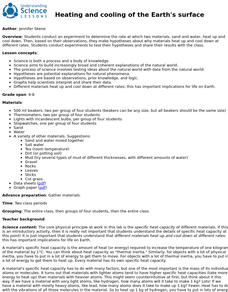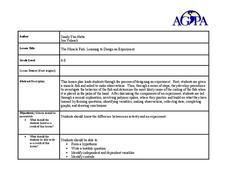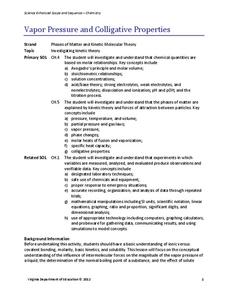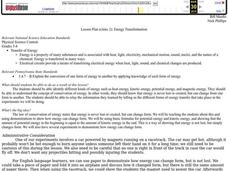Space Awareness
Water is a Heat Sink
One of the key objectives of Europe's Copernicus Earth program is to monitor the temperatures of the oceans and seas on Earth. Young scholars learn the effects of different heat capacities through two experiments. These experiments...
Virginia Department of Education
Heat Transfer and Heat Capacity
It's time to increase the heat! Young chemists demonstrate heat transfer and heat capacity in an activity-packed lab, showing the transitions between solid, liquid, and gaseous phases of materials. Individuals plot data as the changes...
Space Awareness
Oceans as a Heat Reservoir
Oceans absorb half of the carbon dioxide and 80 percent of the greenhouse gases released into the atmosphere. Scholars learn how and why the oceans store heat more effectively than land and how they help mitigate global warming. Pupils...
Kenan Fellows
What Is Heat?
If objects have no heat, how do they can gain and lose it? Scholars experiment with heat, temperature, and specific heat of various substances. They create definitions for these terms based on their own conclusions to complete the fourth...
University of California
Heating and Cooling of the Earth's Surface
Scholars collect data from heating sand and water before forming testable hypotheses about why sand heats up faster. Afterward, they develop and run experiments to test their hypotheses.
Virginia Department of Education
Thermochemistry: Heat and Chemical Changes
What makes particles attract? Here, learners engage in multiple activities that fully describe colligative properties and allow the ability to critically assess the importance of these properties in daily life. Young chemists conduct...
Curated OER
Warm and Toasty
Learners are introduced to the concepts of specific heat and heat capacity. In groups, they design an experiment to test these two topics on various fabrics. They compare and contrast the amount of heat loss on the different materials...
University of Georgia
Energy Content of Foods
Why do athletes load up on carbohydrates the evening before a competition? The lesson helps answer this question as it relates the type of food to the amount of energy it contains. After a discussion, scholars perform an experiment to...
Curated OER
Weather and Oceans: Uneven Heating of the Earth
Students investigate what causes the heat on Earth. In this Earth heating instructional activity, students experiment with different heat sources and determine where the Earth gathers the most heat. Students explore vocabulary words...
Curated OER
The Miracle Fish: Learning to Design an Experiment
Learners develop procedures to explore the behavior of fish. For this scientific experiment lesson students from a hypothesis, write a question, identify different variables and controls in their experiment.
Virginia Department of Education
States of Matter
Scientists have been studying exothermic reactions before they were cool. The lesson begins with a discussion and a demonstration of heat curves. Scholars then determine the heat of fusion of ice and the heat needed to boil water through...
Curated OER
Heat Absorption and Radiation
Students experiment with the concepts of absorption and reflection of radiant energy.
Discovery Education
Cushion It!
Sugar cubes, collide! Groups design protection systems using bubble wrap to protect sugar cubes from being destroyed by falling batteries in the STEM lesson. They consider how the experiment relates to collisions in real-world...
Virginia Department of Education
Vapor Pressure and Colligative Properties
Hate to vacuum, but enjoy using a vacuum pump? Explore a lesson plan that starts with a demonstration of boiling water at various temperatures by using a vacuum pump. Then scholars design their own experiments to measure vapor pressure...
Virginia Department of Education
Soap, Slime, and Creative Chromatography
Do you think chromatography paper suffers from separation anxiety? Young chemists make soap, slime, silly putty, and experiment with chromatography in this lesson. The material includes clear instructions for each experiment along with...
Carnegie Mellon University
Consumer Preferences in Lighting
What is a watt? This tongue-twisting, mind-bending question and others are answered through this instructional activity on the different lighting options available. With the support of a PowerPoint, teach your physical science class...
Curated OER
Cool Times with Heat
Students work with thermometers to complete problems about temperature. They investigate cooling patterns, how location affects temperature, and what happens when water having different temperature is mixed. They measure temperature in...
Curated OER
Measuring Temperatures
Fourth graders participate in a teacher-led discussion about temperature--hot and cold. Each group of students is assigned specific materials for their lab experiment. They record temperatures measured in their journals and then plot...
Virginia Department of Education
Partial Pressure
At some point, everyone has been under pressure—even Dalton! Explore Dalton's law of partial pressures with young chemists as they measure the volume of air extracted from a sample compared to its original volume. Class members perform...
Curated OER
Thermal Expansion
Learners examine how thermal expansion of water can affect sea level. They conduct an experiment that demonstrates what happens to water levels when exposed to heat, record the results on a data sheet, and discuss the results.
Curated OER
Design and Construction of an Eco-House
Students are able to design, construct, evaluate and recommend materials for planned Eco-house to be built on campus. They investigate about good design and plan for construction. Students have a greater knowledge and appreciation of...
Curated OER
Energy Transformation
Students identify different kinds of energy such as heat energy, kinetic energy, potential energy, and magnetic energy. They investigate the concept of conservation of energy.
Curated OER
What is Energy?
Youngsters take a look at the foods they eat, and how they provide energy for them to do things. They look at how body uses the food energy to create movement. Pupils also look at toys/devices in the room that need electrical energy...
























